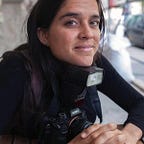oNiRoco
“En una tierra inmensa hay mucho espacio para incubar delirios. El sol que afiebra, la lejanía que huye, generan espejismos. Los espejismos ilusionan… y envician.” — Carlos César (Cachi)Ortegón
“In an immense land there are many ways to incubate deliriums. The sun that fevers, the remote distance running away, they generate mirages. Mirages enchant... and make addictive” — Carlos César (Cachi)Ortegón
The setting for my story is the Orinoco River in the Colombian department of Vichada, which marks the border between rural Colombia and Venezuela. A vastness of earth that sows deliriums. A vastness of water that allows them to rush forth.
Vastness conquered by countless El Dorado dreams. Rivers, jungles, indigenous inhabitants, fibers, minerals, alligator skins, heron feathers. Their sound is that of the utterings of a wizard at the start of a spell, when they’ve been possessed by ambition or mirages projected from afar. The human fever for power and wealth takes more lives than malaria and penetrates the bones of a body — a territory — that continues to resist despite ceaseless efforts to possess it. Oniroco: oneiri * and Orinoco, a combination of river and dreams. Or perhaps nightmares. *In Spanish oneiri is Onirico, which is really close to the name of the river: Orinoco.
I want to tell the stories of the women that share this territory: the indigenous woman — the Sikuani, Amorúa, Piaroa, Puinave, Curripaco and Saliva — the Venezuelan woman, the plains woman. They populate the area around this border, as nomads or sedentary inhabitants and are the ones who guide us through these territories where they are always on the move, allowing us to become part of their memory. The flow is not only of indigenous people who travel as part of their tradition; there are also Venezuelan migrants seeking hope on this rural border of the Orinoco.
Women have suffered the impacts of borders most severely. I have therefore decided that it is their legacy, wounds and present conditions that should be recorded in this first chapter of a project intended to be long-term. For some, the border is the limit between Colombia and Venezuela. For others, it is an encounter with colonizers and their discrimination. There is an urgent need to recount the shocking tales of the most marginalized, like those that tell of drug addiction and child prostitution, common among Amorúa girls and teenagers in the departmental capital of Puerto Carreño. The landscape becomes darker still when we add to it the humanitarian crisis and breakdown taking place in Venezuela, which has led to a monumental increase in prostitution.
My relationship with this land dates back ten years. For seven of them I rode alongside the plains people of the Orinoco savannah on horseback, but I had never seen the mythical river that gives the region its name. It was always a point of reference, a distant echo that gradually pulled me closer and closer to its banks. I arrived two years ago and stayed. I couldn’t escape El Dorado, which for me is the need to tell the stories of this land. I want to search for the visual marks left by the earth, river and jungle in the faces of the people, in their skin. I also want to look for emotions that exit the body to become landscape and atmosphere.
“He told me that at the wedding I should wear the dress I made out of cumare palm fibers because I am indigenous, but I don’t want to. I think to myself, “What if they make fun of me…?”
— Lourdes
“I have to get out what’s inside me. I can’t be so bitter anymore. I have to let it go.” — Liz
“As kids, every three days we would go to the river to fish, and when we were really little, they would leave us on the edge of the river to play. But more than anything, we mostly went to fish, to get something to bring back to eat. And sometimes we would make a trip out of it, like tourists. We would sleep there and spend the whole night by the river. Often in the summertime, my dad would stick poles in the river’s shore to set up the mosquito net for us, and there we would sleep.”
— Gledys
This story was created for the 2017 Joop Swart Masterclass, which has been organized by the World Press Photo Foundation every year since 1994 and has established itself as one of the most prestigious events of its kind. Its goal is to bring together some of the most experienced individuals in photojournalism with 12 young, promising photographers to share and pass on their knowledge and experience. Learn how to apply.
If you liked this article, click and hold 👏 below so others will see it.
